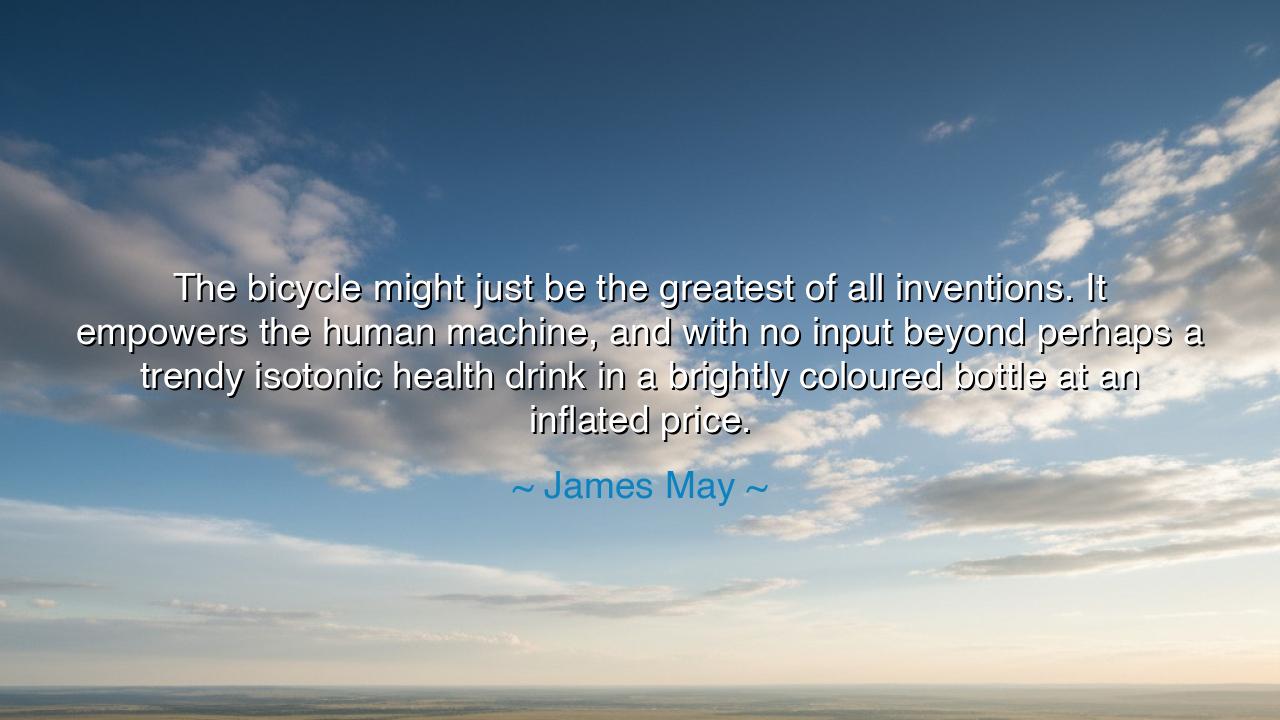
The bicycle might just be the greatest of all inventions. It
The bicycle might just be the greatest of all inventions. It empowers the human machine, and with no input beyond perhaps a trendy isotonic health drink in a brightly coloured bottle at an inflated price.






The modern philosopher and lover of machines, James May, once declared with wit and reverence: “The bicycle might just be the greatest of all inventions. It empowers the human machine, and with no input beyond perhaps a trendy isotonic health drink in a brightly coloured bottle at an inflated price.” Beneath the humor and the gentle jab at modern consumerism lies a truth both profound and timeless. May reminds us that the bicycle, humble and unassuming, is not merely a tool of transport but a symbol of freedom, balance, and harmony between human and invention. It is the purest marriage of body and machine—an instrument that amplifies human power without enslaving it.
In an age overflowing with engines and electronics, where convenience often dulls the spirit, the bicycle stands as a reminder of simplicity perfected. It does not roar like the car, nor consume the earth’s lifeblood as the airplane does. It moves with grace, powered not by combustion or circuit, but by the rhythm of the human body. The rider and the bicycle become one being, a living mechanism in motion. With every turn of the pedals, the machine transforms human effort into flight—quiet, efficient, eternal. In May’s words, we find awe for this ancient invention that still outshines the complexities of modern technology.
The origin of this wisdom reaches back to the nineteenth century, when the first bicycles appeared as curiosities among the elite. Yet their beauty lay not in luxury, but in democracy. For the first time, ordinary people could move with freedom unbound by horse or rail. Women, in particular, found liberation in this new form of motion. The great suffragist Susan B. Anthony once proclaimed, “The bicycle has done more to emancipate women than anything else in the world.” With two wheels and a frame of steel, the bicycle became a chariot of independence, carrying humanity closer not only to its destinations, but to equality itself.
May’s humor—his mention of the “isotonic health drink” and its “brightly coloured bottle”—is not mere jest, but subtle wisdom. He points out how modernity complicates what is simple, how we clothe purity in pretension. The bicycle requires none of this—it needs no fuel, no software, no embellishment. Its nourishment is the rider’s breath, its energy the pulse of human will. In mocking the overpriced sports drink, May calls us to remember that true empowerment lies in simplicity. When we shed the excess, we rediscover the joy that technology once promised but now often obscures.
Consider, for a moment, the story of Major Taylor, the first Black American world champion cyclist at the turn of the twentieth century. In a time of segregation and scorn, he raced with dignity and grace, his bicycle a symbol of resistance and transcendence. He was banned from races, insulted, and yet he rode on—swift as wind, silent as justice. His story embodies May’s truth: that the bicycle empowers the human machine not only in body, but in spirit. It teaches perseverance, equality, and the relentless pursuit of freedom through one’s own strength.
The lesson, then, is clear: cherish simplicity, and honor the tools that elevate humanity without enslaving it. In a world addicted to speed and spectacle, the bicycle reminds us that power need not be loud, and progress need not be wasteful. Every time we ride, we affirm the ancient pact between man and motion—that balance, not excess, is the key to mastery. Just as a rider must trust the delicate harmony of body and wheel, so must we learn to balance ambition with humility, invention with reverence, progress with peace.
So, children of the modern age, remember the wisdom of James May. When life feels too complex, too noisy, too burdened with the machinery of excess, return to the simple things that work because they are honest. Ride a bicycle. Walk beneath the sky. Feel the rhythm of your breath as the wind greets your face. For in that moment, you will understand the ancient truth behind May’s jest: that the greatest inventions are those which make us more human, not less. The bicycle, silent and steadfast, does not carry us away from ourselves—it carries us back to who we were meant to be: free, balanced, and fully alive.






AAdministratorAdministrator
Welcome, honored guests. Please leave a comment, we will respond soon